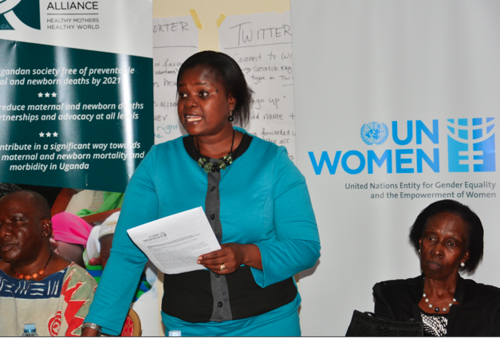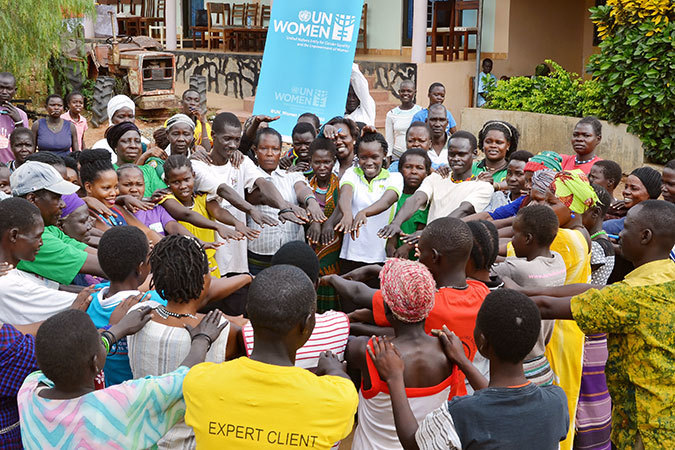In July this year, UN Women trained 250 LC-III women councillors from ten districts about their responsibilities in local leadership. They were encouraged, among others, to form caucuses that would help them push a female-sensitive agenda during council meetings.
As JOSEPH KIMBOWA reports, the trainings have already created an impact in the districts of Gulu, Kitgum, Kotido and Kaberamaido.

Ruth Anna Kiyonga does not know the meaning of gikwateko or togikwatako.
She recently heard over radio that there was a fight in parliament over the presidential age limit and people threw chairs at one another. But this is a topic everyone “fears to discuss here”.
Of Kampala politics, she is sure about one thing: Yoweri Museveni, the man who saved her beloved Karamoja from cattle rustlers, is the only president.
That is all.
The 48-year-old (she looks way over 65) loves it here in remote Lopeer village in the north-eastern Ugandan district of Kotido, some 420 kilometres from Kampala.
Although the current hullabaloo in Kampala about scrapping the constitutional presidential age limit “frightens” her, Kiyonga’s immediate need is to take care of her aging husband, fend for her eight children and be a good local leader.
Exemplary Leader
In this well-knit typical Karimojong manyatta community of Patongor parish – proudly termed the biggest village in east Africa by residents here – Kiyonga’s household is well respected.
She is a model farmer (rears cross-breed goats), a leader and landlord. Her husband Micheal Lopuri has been the LC-I chairperson for 17 years and she has been the area NRM chairperson for a decade. She has six rental rooms in this ward’s ‘trading centre’ where tenants pay Shs 10,000 per month.
“Life is good,” she quips with a shy smile revealing a gap left by two missing lower frontal teeth.
Also the LC-III woman councilor representing Patongor parish, Kiyonga was one of over 20 women councilors from Kotido district trained by UN Women in July 2017 through Forum for Women in Democracy (Fowode) about their roles and responsibilities in local councils.
When I visit her along with a team from UN Women, it is evident that Lopeer residents look up to her.
After receiving us from the village’s ‘trading centre’, she leads us through a series of wood-fenced manyattas lining in parallel curves on either side to her homestead.
Then we literally crawl into her organized compound where she offers a wooden bench.
“I am sorry that you found me dirty,” she says, looking down her fading t-shirt donated by USAid.
Kiyonga then testifies that since the training, she now has a purpose.
“You know women here are usually sidelined. But since the training, we now understood our roles and capabilities and have been able to make our voices heard,” she says.
One component of the trainings was to encourage women councilors to form caucuses to collectively push female-sensitive issues during council meetings.
This formula has proved magical in Lopeer.
“Previously, fellow women would shout you down for being ‘disrespectful’ of men even when you are raising an issue concerning them. But through caucuses, we know that we must speak with the same women voice,” Kiyonga says.
Their caucus has since convinced stubborn Karimojong men that girls should be in school and menstruating ones should be provided with sanitary towels.
“They are responding,” she says. “We have even convinced many families to dig pit latrines. Many other women have learnt from us and are planning to contest for LC-I positions.”
However, Kiyonga says education is still a far-cry in this part of the country. Indeed, this is evident as many children can be seen farming or grazing cattle during school time and those that go to school reach as late as 11am and leave shortly after 3pm.
Primary school fees here averages Shs 10,000 per term.
Lives Changed
Kiyonga’s case mirrors many others of 250 sub-county women councilors from ten Ugandan districts trained by UN Women in partnership with Fowode about gender-responsive measures to improve their leadership skills and participation in politics.
According to Primrose Kibirigi, working with UN Women’s political participation and leadership unit, many women enter political offices without an idea about their responsibilities and end up being overshadowed by male voices.
“These trainings aimed at equipping these women with the confidence and knowledge to push the female agenda as well as gender equality in decision-making,” Kibirigi says.
Basing on the recent follow-up visits in Gulu, Kitgum, Kotido and Kaberamaido, Kibirigi is convinced the trainings were not in vain.
“The short-term results are amazing. Lives are being changed. The commitment exhibited by these women is unbelievable!” she says.
In all four districts visited, the feedback was positive and linear.
In Orom sub-county of Kitgum, for instance, the caucus lobbied local leadership to alter budgeting priorities and buy three motorcycles to transport pregnant mothers to the district hospital. This sub-county is the biggest and most remote in Kitgum.
In Gulu, primary schools have been tasked to provide changing rooms for menstruating girls.
Daring Men
In Amida sub-county of Kitgum, the women caucus helped push through a by-law where if a household was found with a girl out of school, local officials would confiscate and sell any valuable items such as goats and chicken. The money is then used to pay for the girl’s school fees and the balance is given back to parents.
Besides pushing the female agenda, councilors were also trained on how to use their positions to encourage other women or themselves to compete against men.
And we find Rose Oliva Longoli of Kotido is already in campaign mode. Equipped with a diploma in public administration from Nsamizi Training Institute of Social Development, Longoli is convinced that she is the right candidate to take Kotido SS Ward to the next level.
“I am educated and liked by people here. And since the UN Women training, I am confident because I can even stand in front of people in church and read the Bible without shaking,” says the 28-year-old mother of one.
Her counterpart Bena Elasu, 55, in Kaberamaido bases her competence on experience. She has been the LC-I chairperson for Headquarters Cell in Alem sub-parish since President Museveni assumed power in 1986.
Although she served as area LC-II councilor between 2011 and 2016, she declined to stand again last year, targeting the LC-I chair, which she believes is her calling.
“People love me here. I am incorruptible. No man can beat me in this village,” she confidently says, before asking UN Women to bring more trainings to empower more women.
Back in Gulu, Proscovia Laloyo is eying bigger things. Currently the Laroo division speaker, Laloyo is looking forward to contesting for the division chairmanship in the next election.
“I am really proud of the training by UN Women. Now men can feel us. I am the speaker and it is easy for women to have their voice heard since I am the final ruler,” she says with a grin.
She, however, wants UN Women to take all women it trained for benchmarking in other districts; “to compare notes”.
UN Women’s Kibirigi says Laloyo’s example is a step in the right direction.
“This is a five-year running programme. We target women leaders immediately after they enter office and follow them through their terms of office as we prepare them to contest for the same or bigger offices in the next election,” she says. “It is encouraging to hear that some are already eyeing bigger offices.”
Forget togikwatako or gikwateko. What Laloyo, Elasu or Kiyonga have in common is the new-found inspiration that politics is no longer a pastime and men’s activity, but a passion and purpose for many rural women of impoverished northern Uganda and Karamoja.

